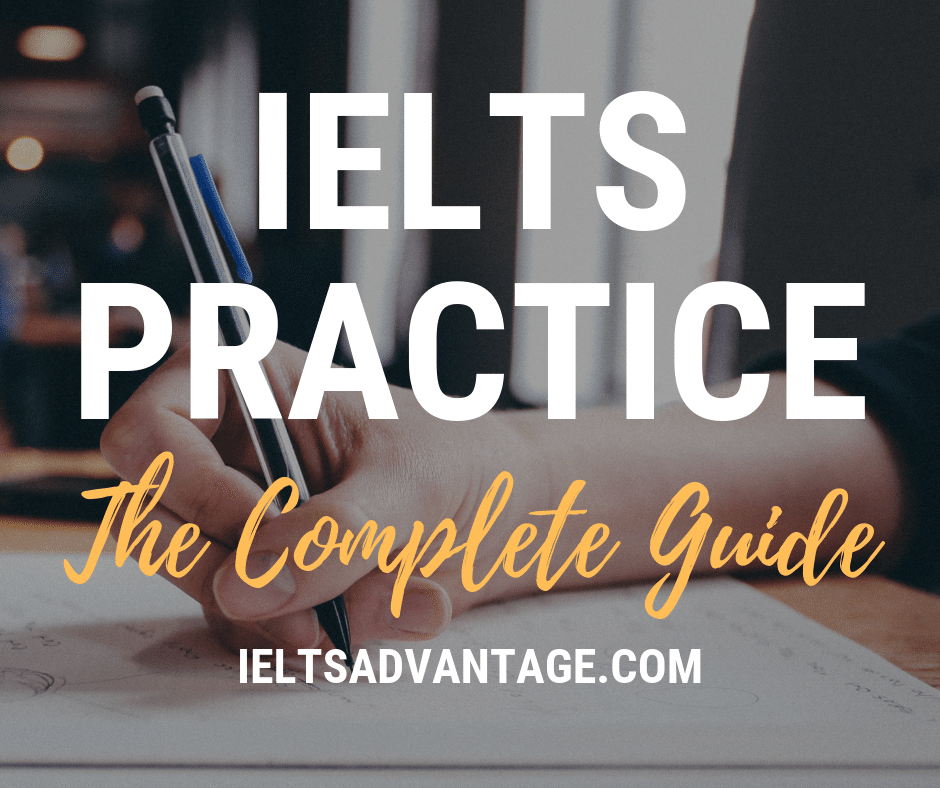This article will tell you everything you need to know about practising for the IELTS exam, including:
- How to find the best practice material
- Why you should beware of FAKE IELTS practice materials
- Links to official IELTS practice tests and books
- How to practice wisely
- Next steps
How to Find the Best IELTS Preparation Material
You have probably heard the phrase ‘Practice makes perfect.’ That’s the one everybody knows, but for IELTS practice, I prefer:
“Practice does not make perfect. Only perfect practice makes perfect.” – Vince Lombardi
You only have a limited amount of time before your test. Using this wisely is crucial. One of the biggest mistakes you can make is practising using poor IELTS practice materials.
This article will show you which sources you can use for your IELTS practice and which to stay away from.
We will also look at how to practice more effectively to ensure your best possible performance on test day.
To get started, check out my video lesson below:
Beware of Fake IELTS Practice Materials
Let me tell you a little secret, 90% of the IELTS practice materials on the internet and in books are fake. Using these will jeopardise your chances of getting the score you need and are a complete waste of time.
Why are there so many fake sources out there? Quite simply, clicks! Most IELTS websites make money from advertising clicks. You’ve probably noticed we are one of the only sites that do not allow advertising on our site. One of the easiest ways to get clicks is to create fake IELTS practice materials and then use these to get more clicks.
Just because a website has ‘IELTS’ in the title and URL does not mean it is a real or reliable site. Anyone can set up an IELTS website.
These fake materials create a false sense of the test. Nearly all of the questions are misleading or inaccurate. For example, most of the Task 2 Writing questions are on very difficult topics and do not follow the same format as the real test. This creates lots of anxiety for students and often leads them down the wrong path. There isn’t a day that goes by that I don’t get an email from a panicked student worrying about a fake question they’ve just found on the internet.
You should only use IELTS practice materials from official sources.
Official IELTS Sources
There are four sources you should trust and four sources only:
- Cambridge English
- IDP
- British Council
- IELTS.org
Using the above sources for your IELTS practice materials will ensure that you are using real questions developed by experts. It takes months to create one test and they are thoroughly tested before they are released to the public.
Using these sources will ensure you get an accurate impression of what you will face during your test and make sure you get a real sense of how you will perform.
Links to Free IELTS Practice Materials
- Cambridge English Free Sample Papers
- IELTS.org Sample Test Questions
- British Council Free Practice Tests
- IDP Free IELTS Tests
You will find a huge number of free IELTS tests to practice by clicking the links above. You are also guaranteed that they have been produced by experts and they are reliable. Your test is too important to mess around with fake materials.
IELTS Practice Books
Just like the materials you find on the internet, books can also be fake. It is equally important that you only use ‘real’ books. How can you tell if they are real or fake? Only buy books from established publishers with a good reputation. Just because a book is sold on Amazon or your local bookstore doesn’t actually mean it is reliable.
Also, you should be wary of ‘soft’ copies that you can download. These are often fake and do not reflect the real hard copy. It is also illegal to download these. If a website is so desperate for your clicks that they are prepared to break the law, you should be very wary of that site.
Here’s a list of books that have reliable practice materials:
- The Official Cambridge Guide to IELTS
- IELTS Trainer
- Official IELTS Practice Materials
- Practice Tests for IELTS (Collins)
- Cambridge IELTS Series (There are 12 Books in this series)
I have no affiliation with any of the books above, but I have used them all in the classroom and consider them all to be very useful.
The links above are all Amazon links (none of them are affiliate links) because you’ll be able to compare all the different titles and order them if Amazon is available in your region. If not, ask in your local book store. There are very few places in the world where you can’t get these books.
How to Practice
The most important thing to realise is that you do not have to practice every single test in order to do well. Obviously, the more you practice, the better, but you need to balance practice out with learning and implementing what you’ve learned.
Here’s what bodybuilders can teach us about IELTS practice. Sounds silly, but stay with me 🙂
In order to build muscle, a bodybuilder needs to do two principal things; eat and train. If they do not eat enough, they will never put on more muscle. Equally, if they do not train, they will never get bigger.
However, if they eat too much and do not train, they will simply get fat. Equally, if they train too much and do not eat enough, they will get too skinny.
This is very much like IELTS practice. You must have a balance of learning and practice. Many students consume far too much content and do not practice enough. But at the same time, other students practice far too much and do not actually learn anything.
Like most things in life, a balance is crucial. Here are some tips for how to optimise your IELTS practice:
- Figure out what you need before you start. Some people are complete beginners and need help with everything. Others just need to fix a few crucial areas. The problem is that most schools and review centres treat everyone as a group, rather than individuals. Invest in an IELTS expert or ask your IELTS teacher to develop a personalised study schedule for you, or at the very least, tell you where you should be focusing.
- Do not jump from teacher to teacher, book to book and website to website. You are going to get lots of conflicting advice that is confusing and time-wasting. Pick one reliable teacher and stick with them.
- Focus first on learning and consuming new information. Do not expect to be able to learn it 100% immediately. It will take you time to learn it fully.
- Implement what you have learnt. Take each area and apply it to the test. For example, if you are learning how to write Task 1 overviews, learn what you need and then look at many different sample questions and apply what you’ve learned.
- Practice slow and fast. It will take you time to move from someone who is getting used to new concepts, to someone who can apply them in the real test. Take your time when you are doing practice tests at the start and slowly build up to doing them under exam conditions.
Remember, just reading articles and videos alone is not going to help you if you don’t implement what you’ve learned and practice. At the same time, just practising without actually learning anything, is not going to help you. Strike a balance.
Advanced IELTS Practice
If you want to improve your score as effectively as possible, you should hire an expert. An IELTS expert will be able to establish what your specific areas of weakness are and tell you exactly what you need to do to improve.
However, be very careful! The word ‘expert’ has become very loose these days, especially in the context of IELTS. Make sure your expert comes highly recommended. They should be able to show you proof that they were an examiner if they claim that they are and they should have a large number of testimonials from real people that they have helped in the past.
Experts cost money, but they are normally much cheaper than having to repeat the test several times.
IELTS Practice: Next Steps
For a step-by-step guide to preparing for the IELTS exam, you should try my newly updated FREE IELTS Fundamentals Course. It’s completely free of charge and includes videos, tasks and feedback documents. You can learn more about it here.
My video below will explain how you can improve your IELTS preparation by making one simple change – STOP overthinking it!





